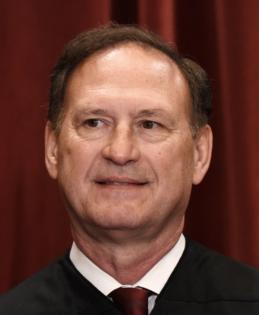Supreme Court's Alito calls block of deportations 'questionable'
Published in Political News
The U.S. Supreme Court acted on “unprecedented and legally questionable” grounds when it blocked President Donald Trump’s administration from deporting Venezuelans to a notorious prison in El Salvador, Justice Samuel Alito said in a dissent.
The conservative-leaning justice issued the dissent late Saturday to the high court’s order that — for now — bars the government from using the Alien Enemies Act of 1798 to expel alleged Venezuelan gang members.
The Supreme Court intervened around 1 a.m. Saturday in Washington after detainees filed urgent requests in four courts to block their deportation from the Bluebonnet Detention Center in Anson, Texas. Lawyers for the men said they were being put on buses and faced imminent deportation. The detainees allegedly weren’t given adequate notice on how to contest their removal.
But Alito’s five-page dissent said it’s “questionable” whether lawyers for the detainees followed proper procedures in giving a federal judge in Texas little time to act on Good Friday, before rushing to an appeals court based in New Orleans and then to the Supreme Court.
Alito objected to granting “unprecedented and legally questionable relief without giving the lower courts a chance to rule, without hearing from the opposing party, within eight hours of receiving the application, with dubious factual support for its order, and without providing any explanation for its order.”
“We had no good reason to think that, under the circumstances, issuing an order at midnight was necessary or appropriate,” he wrote.
Justice Clarence Thomas joined Alito’s dissent.
The Trump administration on Saturday asked the Supreme Court to roll back its decision, arguing that the order was overbroad and premature.
U.S. Solicitor General D. John Sauer said the detainees’ lawyers were wrong to turn to the justices without giving lower courts time to rule on claims that the men weren’t given an adequate opportunity to contest their deportation.
“The lower courts have not found critical facts in this case,” said Sauer, the administration’s top Supreme Court lawyer. “There has been no fact-finding about the timing, nature, and manner of notice that the government has given” the detainees.
The order said the pause applies “until further order of this court,” indicating that the justices will take additional action now that the Trump administration has filed its response.
The showdown is the latest escalation in Trump’s campaign to circumvent the federal judiciary. In March, Trump sent more than 200 alleged gang members to the Salvadoran prison, even as a judge verbally ordered that two planes turn around.
The Supreme Court said April 7 that accused Tren de Aragua gang members must get a “reasonable time” to challenge their deportation in federal court. Many of the detainees say they aren’t gang members, and contend Trump can’t deport them by invoking the Alien Enemies Act, a law previously used only in wartime. The Supreme Court hasn’t resolved whether Trump’s use of that law is legal.
“These men were in imminent danger of spending their lives in a horrific foreign prison without ever having had a chance to go to court,” said Lee Gelernt of the American Civil Liberties Union, the lead lawyer in the case. He said the court “has not permitted the administration to whisk them away the way others were just last month.”
The Supreme Court case is A.A.R.P. v. Trump, 24A1007.
_____
(With assistance from Greg Stohr.)
_____
©2025 Bloomberg L.P. Visit bloomberg.com. Distributed by Tribune Content Agency, LLC.




























































Comments